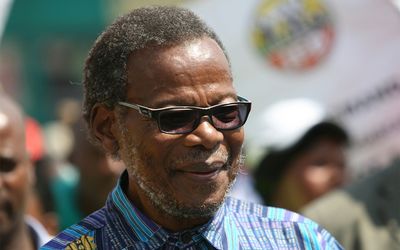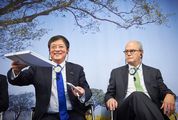THE 2014 polls are set to force small opposition parties into further obscurity, given lacklustre campaigns, leadership that has not changed since the parties were formed, and the rise of new players.
The build-up to the election has been loud and clamorous, with most parties scenting a turn-around in the air, with the ruling African National Congress (ANC) under intense pressure, under the scandal-prone leadership of President Jacob Zuma.
It is the ANC’s weakness that many parties have sought to capitalise on, rather than showcasing their own strengths. Most have not sought to change their strategies fundamentally ahead of the poll to meet the needs of an electorate whose confidence in their ability to win is dwindling.
The Inkatha Freedom Party (IFP) is likely to take a blow: it is the first national election it is contesting after the relatively successful split by former chairwoman Zanele kaMagwaza-Msibi to form the National Freedom Party ahead of the 2011 local elections.
While IFP leader Prince Mangosuthu Buthelezi has called for a "revolution" to undercut the power of the ANC, his party’s share of the vote has been in steady decline since 1994, when it won more than 2-million votes. In the 2009 polls, the IFP got slightly above 800,000 votes, after declining to 1.38-million votes in 1999 and just over a million votes in 2004.
IFP national organiser Alco Ngobese dismisses talk of the imminent demise of his party, saying all political parties have been shedding votes, including the ANC. He concedes the NFP split could "play a role" in the upcoming polls and have a negative effect on the party’s support, but the IFP is still hopeful its share of the vote will either grow or remain stable.
United Democratic Movement leader Bantu Holomisa has run a robust campaign, springing into action immediately after the Marikana massacre in August 2012. He immediately sought to capitalise on the deep resentment felt in the mining sector towards the ANC-aligned National Union of Mineworkers.
It is understood senior leaders of the Association of Mineworkers and Construction Union are sympathetic to the UDM. However, the federation to which the union belongs, the National Council of Trade Unions, has thrown its support behind Julius Malema’s Economic Freedom Fighters as well as its traditional political alignment to the Pan Africanist Congress.
Mr Holomisa is unfazed. "I cannot predict results," he says. "My focus is not on other political parties, it is on the voter."
Mr Holomisa is also capitalising on the implosion of the Congress of the People (COPE) through ties with former founder Mbhazima Shilowa, who failed to capture the party from rival Mosiuoa Lekota – after COPE’s strong showing in 2009, it descended into factional fights which have resulted in the destruction of the party, with high-profile members returning to the ANC in large numbers.
The UDM, which contested elections for the first time in 1999, shed a large number of votes in 2009, dropping from 355,717 votes in 2004 to 149,680.
The African Christian Democratic Party (ACDP), under the leadership of founder Rev Kenneth Meshoe, mainly blames the tactics used by the Democratic Alliance (DA) for the poor showing among smaller opposition parties in the 2009 election: "Slogans were used — for example, when the DA said vote for a strong opposite, a vote for a small party is a wasted vote."
He does not think voters will "fall for this" again. "It is time to stop thinking about a strong opposition but time to think about a Godly government," he says.
Rev Meshoe says it is opportune for the party that religious leaders from various churches found their voices ahead of the polls and even marched to Parliament. "The ACDP will be the shocker in this election," he says.
But the ACDP’s support fell from slightly over 250,000 votes in 2004 to about 143,000 in 2009.
The Freedom Front Plus hopes to capitalise on disgruntled Afrikaner voters within the DA.
Most opposition parties are opposed to the Vote No Campaign launched by former ANC and alliance leaders Ronnie Kasrils and Nozizwe Madlala-Routledge.
The campaign calls on voters to protest against scandals such as Nkandla by either spoiling their ballots or voting "tactically" for a smaller party.
Opposition parties are unhappy about the spoiled ballots aspect, but some believe the call for South Africans to vote "tactically" will work in their favour. It is not, however, a long-term solution to the decline in party performance.
Rev Meshoe says those parties that do not succeed in this election should "close up shop", as the ANC is at "its weakest".
Parties have recognised that if they do not halt their erosion they risked becoming irrelevant, and there have been moves towards coalitions. In December the ACDP, COPE, the FF Plus, the IFP and the United Christian Democratic Party formed the Collective for Democracy, aimed at working together to "advance democracy" and contest elections to secure enough representation to form a new government. The official opposition, the DA, also sought to merge with newcomer Agang, with Mamphela Ramphele as presidential candidate. But the attempt failed hopelessly, resulting in widespread disillusionment in Agang’s ranks.
The upcoming polls are a keen test for the DA too, as it attempts to debunk perceptions that it has reached its electoral ceiling.

Prince Mangosuthu Buthelezi. Picture: SOWETAN
THE 2014 polls are set to force small opposition parties into further obscurity, given lacklustre campaigns, leadership that has not changed since the parties were formed, and the rise of new players.
The build-up to the election has been loud and clamorous, with most parties scenting a turn-around in the air, with the ruling African National Congress (ANC) under intense pressure, under the scandal-prone leadership of President Jacob Zuma.
It is the ANC’s weakness that many parties have sought to capitalise on, rather than showcasing their own strengths. Most have not sought to change their strategies fundamentally ahead of the poll to meet the needs of an electorate whose confidence in their ability to win is dwindling.
The Inkatha Freedom Party (IFP) is likely to take a blow: it is the first national election it is contesting after the relatively successful split by former chairwoman Zanele kaMagwaza-Msibi to form the National Freedom Party ahead of the 2011 local elections.
While IFP leader Prince Mangosuthu Buthelezi has called for a "revolution" to undercut the power of the ANC, his party’s share of the vote has been in steady decline since 1994, when it won more than 2-million votes. In the 2009 polls, the IFP got slightly above 800,000 votes, after declining to 1.38-million votes in 1999 and just over a million votes in 2004.
IFP national organiser Alco Ngobese dismisses talk of the imminent demise of his party, saying all political parties have been shedding votes, including the ANC. He concedes the NFP split could "play a role" in the upcoming polls and have a negative effect on the party’s support, but the IFP is still hopeful its share of the vote will either grow or remain stable.
United Democratic Movement leader Bantu Holomisa has run a robust campaign, springing into action immediately after the Marikana massacre in August 2012. He immediately sought to capitalise on the deep resentment felt in the mining sector towards the ANC-aligned National Union of Mineworkers.
It is understood senior leaders of the Association of Mineworkers and Construction Union are sympathetic to the UDM. However, the federation to which the union belongs, the National Council of Trade Unions, has thrown its support behind Julius Malema’s Economic Freedom Fighters as well as its traditional political alignment to the Pan Africanist Congress.
Mr Holomisa is unfazed. "I cannot predict results," he says. "My focus is not on other political parties, it is on the voter."
Mr Holomisa is also capitalising on the implosion of the Congress of the People (COPE) through ties with former founder Mbhazima Shilowa, who failed to capture the party from rival Mosiuoa Lekota – after COPE’s strong showing in 2009, it descended into factional fights which have resulted in the destruction of the party, with high-profile members returning to the ANC in large numbers.
The UDM, which contested elections for the first time in 1999, shed a large number of votes in 2009, dropping from 355,717 votes in 2004 to 149,680.
The African Christian Democratic Party (ACDP), under the leadership of founder Rev Kenneth Meshoe, mainly blames the tactics used by the Democratic Alliance (DA) for the poor showing among smaller opposition parties in the 2009 election: "Slogans were used — for example, when the DA said vote for a strong opposite, a vote for a small party is a wasted vote."
He does not think voters will "fall for this" again. "It is time to stop thinking about a strong opposition but time to think about a Godly government," he says.
Rev Meshoe says it is opportune for the party that religious leaders from various churches found their voices ahead of the polls and even marched to Parliament. "The ACDP will be the shocker in this election," he says.
But the ACDP’s support fell from slightly over 250,000 votes in 2004 to about 143,000 in 2009.
The Freedom Front Plus hopes to capitalise on disgruntled Afrikaner voters within the DA.
Most opposition parties are opposed to the Vote No Campaign launched by former ANC and alliance leaders Ronnie Kasrils and Nozizwe Madlala-Routledge.
The campaign calls on voters to protest against scandals such as Nkandla by either spoiling their ballots or voting "tactically" for a smaller party.
Opposition parties are unhappy about the spoiled ballots aspect, but some believe the call for South Africans to vote "tactically" will work in their favour. It is not, however, a long-term solution to the decline in party performance.
Rev Meshoe says those parties that do not succeed in this election should "close up shop", as the ANC is at "its weakest".
Parties have recognised that if they do not halt their erosion they risked becoming irrelevant, and there have been moves towards coalitions. In December the ACDP, COPE, the FF Plus, the IFP and the United Christian Democratic Party formed the Collective for Democracy, aimed at working together to "advance democracy" and contest elections to secure enough representation to form a new government. The official opposition, the DA, also sought to merge with newcomer Agang, with Mamphela Ramphele as presidential candidate. But the attempt failed hopelessly, resulting in widespread disillusionment in Agang’s ranks.
The upcoming polls are a keen test for the DA too, as it attempts to debunk perceptions that it has reached its electoral ceiling.





















Change: -0.98%
Change: -1.03%
Change: -2.27%
Change: -0.80%
Change: -0.62%
Data supplied by Profile Data
Change: -1.43%
Change: -0.47%
Change: -0.98%
Change: 0.00%
Change: -0.49%
Data supplied by Profile Data
Change: 1.49%
Change: 1.43%
Change: 1.29%
Change: 1.40%
Change: 1.40%
Data supplied by Profile Data
Change: 0.02%
Change: -0.31%
Change: 0.59%
Change: -1.38%
Change: -2.59%
Data supplied by Profile Data